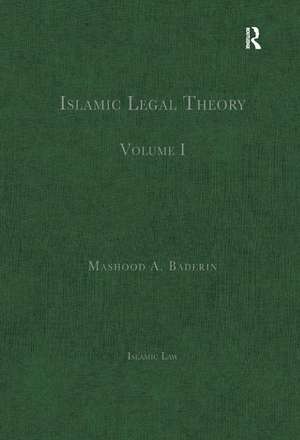Islamic Legal Theory: Volume I: Islamic Law
Editat de Mashood A. Baderinen Limba Engleză Hardback – 20 mai 2014
Preț: 1869.53 lei
Preț vechi: 2675.61 lei
-30% Nou
Puncte Express: 2804
Preț estimativ în valută:
357.73€ • 374.50$ • 296.00£
357.73€ • 374.50$ • 296.00£
Comandă specială
Livrare economică 15-29 martie
Doresc să fiu notificat când acest titlu va fi disponibil:
Se trimite...
Preluare comenzi: 021 569.72.76
Specificații
ISBN-13: 9780754628781
ISBN-10: 0754628787
Pagini: 600
Dimensiuni: 169 x 244 x 44 mm
Greutate: 3.1 kg
Ediția:1
Editura: Taylor & Francis
Colecția Routledge
Seria Islamic Law
Locul publicării:Oxford, United Kingdom
ISBN-10: 0754628787
Pagini: 600
Dimensiuni: 169 x 244 x 44 mm
Greutate: 3.1 kg
Ediția:1
Editura: Taylor & Francis
Colecția Routledge
Seria Islamic Law
Locul publicării:Oxford, United Kingdom
Cuprins
Contents: Introduction; Further reading. Part I Nature of Islamic Law: Islamic law: an overview of its origin and elements, Irshad Abdal-Haqq; Islamic law as Islamic ethics, A. Kevin Reinhart; Understanding Islamic law in theory and practice, Mashood A. Baderin. Part II Sources of Islamic Law: Groundwork of the moral law: a new look at the Qur’Än and the genesis of SharÄ«Ê»a, Wael B. Hallaq; Law in the Qur’Än - a draft code, Tahir Mahmood; Some reflections on the contextualist approach to ethico-legal texts of the Qur’an, Abdullah Saeed; A revaluation of Islamic traditions, Joseph Schacht; On the origins of ShÄ«Ê»i ḤadÄ«th, Ron P. Buckley; The role of culture in the creation of Islamic law, John Hursh. Part III Methods of Islamic Law: Al-ShÄfiʻī’s role in the development of Islamic jurisprudence, Ahmad Hasan; The concept of IjmÄÊ» in Islamic law: a comparative study, Rahimin Affandi Abd Rahim; Non-analogical arguments in Sunni juridical qiyÄs’, Wael B. Hallaq; ’Illa and qiyÄs in early Islamic legal theory, Nabil Shehaby. Part IV Principles of Islamic Law: The maslaha (public interest) and ’illa (cause) in Islamic law, Majid Khadduri; Maá¹£laḥa in contemporary Islamic legal theory, Felicitas Opwis; Legal logic and equity in Islamic law, John Makdisi; MaqÄá¹£id al-SharÄ«Ê»ah: the objectives of Islamic law, Mohammad Hashim Kamali; Cut and paste in legal rules: designing Islamic norms with talfÄ«q’, Birgit Krawietz; Muslim custom and case-law, Noel James Coulson; QawaÊ»id al-Fiqh: the legal maxims of Islamic law, Mohammad Hashim Kamali. Part V Legal Reasoning (IjtihÄd): Interpretation in Islamic law: the theory of ijtihÄd, Bernard Weiss; The closing of the door of ijtihÄd and the application of the law, Frank E. Vogel; A critical analysis of the role of ijtihÄd in legal reforms in the Muslim world, Rachel Anne Codd; IjtihÄd in contemporary ShiÊ»ism: transition from individual-oriented to society-oriented, Hamid Mavani. Name index.
Notă biografică
Mashood A. Baderin is Professor of Law at the School of Law, SOAS, University of London, UK.
Descriere
This volume addresses the sources, methods and principles of Islamic law leading to an appreciation of the skills of independent juristic and legal reasoning necessary for deriving specific rulings from the established sources of the law. The articles engage critically with relevant traditional views to enable a diagnostic understanding of the different issues, covering both SunnÄ« and ShÄ«’Ä« perspectives on some of the issues for comparison. The volume features an introductory overview of the subject as well as a comprehensive bibliography to aid further research.

